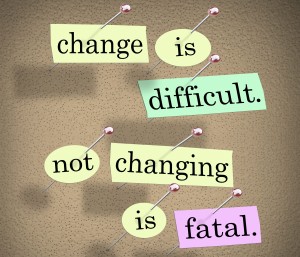#CareerAdvice : #CareerChange – 9 Tips from People Who Made Dramatic #CareerChanges …It is Estimated that 40 Percent of Current US Employees are Disengaged at Work. Are you One of Them?
Some don’t like the company or their boss, but other times the frustrations run a lot deeper — maybe you realize your career doesn’t give you satisfaction, let alone a sense of purpose or happiness. So how do you know what you should be doing instead? And even if you do know, how do you get there?
This is why I founded Repurpose Your Purpose: to help people who feel stuck change their careers. Recently, I invited Anthony Barcelo, VFX (Visual Effects) Supervisor and Senior Compositor for TV, commercials and feature films; Darren Marble, CEO of CrowdfundX (CfX); Ronnie Mok, Sr. Technical Program Manager of Product Design at Hulu; and Nicki Klein, Co-Founder and CEO of Betagig, to join me on a panel discussion on their successes and failures in changing careers at WeWork Constellation in Century City.
These are some of my favorite lessons from our talk:
1. Finding “the One” Takes Time
There’s a persistent myth that you can just read a book, do some self-help exercises, choose a career and voilà! You can go out and find “the one.” Don’t buy into this narrative.
Every one of my panelists changed careers at least once before landing at their current gig. Some changed multiple times. Barcelo, for example, didn’t think of visual effects as his ideal career right away. It grew on him organically until it became his career, and a very successful one at that!
Like this Article ? Share It ! You now can easily enjoy/follow/share Today our Award Winning Articles/Blogs with Now Over 2.5 Million Growing Participates Worldwide in our various Social Media formats below:
FSC LinkedIn Network: www.linkedin.com/in/fscnetwork
Facebook: http://www.facebook.com/pages/First-Sun-Consulting-LLC-Outplacement-Services/213542315355343?sk=wall
Google+: https://plus.google.com/115673713231115398101/posts?hl=en
Twitter: Follow us @ firstsunllc
Question: Want the ‘the best/current articles/blogs on the web’ on Job Search, Resume, Advancing/Changing your Career, or simply Managing People?
Answer: Simply go to our FSC Career Blog below & type(#career, #leadership, #life) in Blog Search: https://www.firstsun.com/fsc-career-blog/
What Skill Sets do You have to be ‘Sharpened’ ?
Continue of article:
2. Don’t Sit Back and Wait
Too often we have a feeling something is not working in our career, but we keep waiting for the perfect opportunity to show up before we do something about it. We want to know what to do next, and we want to see a safe path to it. And so we wait, day after day, for that “aha” moment when we finally just figure it all out.
It may be disappointing to hear, but you probably won’t know what to do and how to be successful at it until you do it. Most likely, you will have to follow that hunch that you should be doing something else and then try to do something different, fail, pivot and try again until you find your calling.
3. When It’s Right, You’ll Know
You might not experience an epiphany before quitting your current job, but when you finally find the right career, you will know for sure. Mok used to work as a designer supporting marketing in an agency setting. And she couldn’t shake the feeling that her career, and all that she was creating, were disposable. It was only when she switched to a Program Manager role in the Product Design department at Hulu that everything clicked. Now she has great work/life balance, loves the people she works with and feels that everything has fallen into place.
4. Figure Out Who You Like to Work With
We spend way too much time thinking about what we want to do and not enough about who we want to do it with. One powerful way to assess whether a certain profession is right for you is to hang out with people who are doing it, then ask yourself: Do you feel you would get along? If a career is a good fit, you will find you have a certain affinity with others in that same career. So next time you go to a networking event or meet new people, see if you notice a trend.
5. Find a Job That Fits Your Life
Mok found happiness in her career once she stopped crafting her identity around her job and found work that allowed her to live her life. Now, work is part of her life, but it doesn’t define it. She teaches yoga, climbs and has a lot of other hobbies. Are you unable to choose your next career because you are too wrapped up in how it defines you a person? Try taking a holistic view of what makes you happy besides work, and how your ideal job would help accommodate that.
6. Dust Yourself Off and Try Again
I invited Klein to join me on the panel months ago. She is an amazing entrepreneur, changed careers multiple times, won the Launch Hackathon 2016 with an all-woman team, and went on to get VC funding for her startup Betagig. Amazing, right? But a week before the panel, she announced that Betagig folded. I have to confess, for a moment I wondered whether to cancel her appearance. And then I realized I had just fallen into the very real trap of people who only tell stories of hardships when there is a happy ending. What a bunch of BS! With Repurpose Your Purpose, I want to have real and authentic discussions about changing careers.
As soon as I checked in with Nicki, I realized she was ready to move onto her next project. As someone who had changed careers before, she recognized that failure is part of the process — each time you put yourself out there, you learn new skills, overcome your own limitations, learn about yourself and the world and ultimately, get closer to whatever it is you’re meant to do. Nicki’s story turned out to be among the most valuable of the evening, as people felt inspired and encouraged to take risks.
By the way, this story ends up having a great happy ending after all… just recently, Nicki announced she landed the role of Sr. Technical Product Manager at Amazon Web Services. You might fail in one career or project you embarked on, but have faith that all you learn in the process will lead you to a new and often unexpected path.
7. Failure Builds Confidence
It seems counterintuitive, but each panelist mentioned that failing gave them the courage to continue. The more they failed and learned from it, the less scared they were the next time around, and the more they learned how to handle new challenges while building confidence. So if you are afraid of failure, remember that there is no way around it — only through it!
8. You Can Go Back to School… or Not
Barcelo went back to school to sharpen his film skills and found a lot of confidence and success in doing so. He described it as “building a new toolset to handle new challenges.” Marble did the exact opposite — he dropped out of college early on and learned by doing. The choice is yours, and a lot will depend on the career you pursue and your personality.
9. Anyone Can Change Careers
You don’t have to be young, childless, wealthy and single to change careers. Barcelo shared how having a wife and children to support motivated him to push forward and finally make better choices. Marble started on his journey as an entrepreneur with a wife, two kids, a mortgage and no savings. It took him five years to build a financially successful business, and he kept working at his day job until the income from the business was 85 percent of his salary. When he finally quit his job, he reminded himself that “if you have a career right now, you are likely employable” — and worst case scenario, he could always get another job within his same field.
About the Author: Aurora Meneghello is a Los Angeles-based career coach and the founder of Repurpose Your Purpose. You can find details and reserve your spot for her next panel discussion on changing careers here.
GlassDoor.com | January 3, 2018


